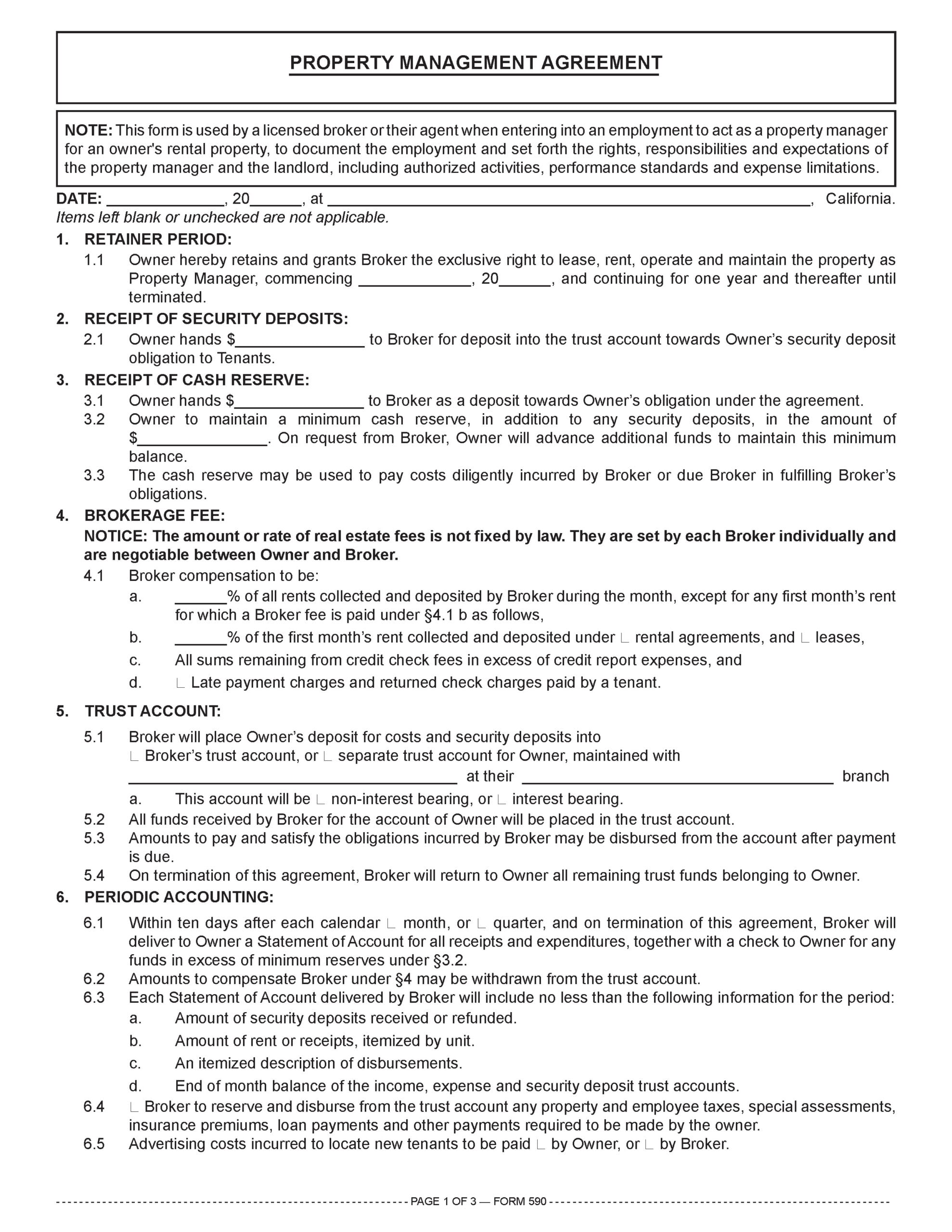Authority to operate a rental property
Property management is an economically viable and personally rewarding real estate service permitted for real estate licensees. Serious brokers and agents often turn their attention from services rendered in residential sales to the specialized and recession-proof discipline of property management.
The duty of care a property manager owes a landlord is the same duty of care and protection a broker in real estate sales owes their sellers and buyers. As a property manager, the broker is an agent acting in the capacity of a trustee on behalf of the landlord.
A property manager’s authority to take possession and control of income-producing real estate and manage its leases, rents, expenses, mortgage payments and accounting in expectation of a fee is established in a property management agreement. [See RPI e-book Real Estate Property Management, Chapter 8]
The property management agreement sets out the specific rights, responsibilities and expectations of the property manager and the landlord who employs them, including authorized activities, minimum performance standards and expense limitations. [See RPI Form 590]
Landlord responsibilities include providing the property manager with the information and items necessary to properly manage the property and its tenants, such as:
- copies of existing lease and rental agreements;
- service and maintenance contracts;
- utilities information;
- keys and security devices;
- security deposits; and
- information on hazard and worker’s compensation insurance for the property and employees.
The property management agreement authorizes the property manager to:
- locate tenants;
- enter into rental and lease agreements, including leases for a term of over one year;
- deliver possession of units or space;
- collect rents;
- incur operating expenses; and
- disburse funds to pay expenses, mortgage payments and management fees. [Calif. Civil Code 1624(a)(3)]
Related video:
Related, a resident manager is employed by either the landlord or the property manager who manages the apartment building or complex. The resident manager lives on the premises as a requirement of their employment. The on-site resident manager handles the daily operations of an apartment building comprising 16 or more residential units. [See RPI Form 591]
Change in ownership and management
The owner, property manager or resident manager responsible for entering into rental and lease agreements notifies all tenants of the name and address for service on the owner of notices or a complaint initiated by the tenant. [See RPI e-book Real Estate Property Management, Chapter 11]
This information is handed to the tenants within 15 calendar days after any change in:
- the manager of the property;
- the owner of the property, unless the new owner appoints an agent-for-service; or
- the owner’s agent-for-service. [See RPI Form 554]
To disclose a change in ownership or management, the property manager or resident manager responsible for leasing is to:
- prepare the notice of change of ownership or property management as an addendum to each existing rental or lease agreement and hand it to each tenant to sign and return [See RPI Form 554]; or
- post on the property the names and addresses of the property manager, resident manager and owner’s agent-for-service.
The notice also includes information regarding how and when rent will be paid. A successor owner or property manager may not serve a tenant with a notice to pay rent or quit or file an unlawful detainer (UD) action based on rent unpaid and due during the period in which the successor owner or property manager failed to provide rent payment information. [CC §1962(c)]
However, the owner or property manager’s failure to timely provide rent payment information does not excuse a tenant of their obligation to pay rent.
A residential property manager (or resident manager) in charge of leasing who fails to provide the name and address of the owner or their agent-for-service:
- automatically becomes the owner’s agent-for-service of process and agent for receipt of all tenant notices and demands [CC §1962(d)(1)]; and
- is treated as the owner, not the owner’s agent, and liable for performing all obligations described under rental and lease agreements with tenants. [CC §1962(d)(2)]
When the person signing the lease or rental agreement for the owner fails to make the disclosures, the tenant may have no indication the person signing is not the owner. However, this does not relieve the owner of liability to tenants. It merely extends liability to the property manager or resident manager who failed to give the required agency notice identifying themselves as agent for the owner. [CC §1962(e)]
Related article:
The property management agreement
A licensed broker or their agent uses the Property Management Agreement published by Realty Publications, Inc. (RPI) when entering into an employment to act as a property manager for an owner’s rental property. The form allows the broker to document the employment and set forth the rights, responsibilities and expectations of the property manager and the landlord, including authorized activities, performance standards and expense limitations. [See RPI Form 590]
The Property Management Agreement contains:
- a retainer period, documenting the time period for which the owner grants the broker the right to maintain the property as property manager [See RPI Form 590 §1];
- security deposits the broker will deposit into a trust account [See RPI Form 590 §2];
- a receipt of cash reserve detailing the money the owner hands the broker as a deposit and the minimum cash reserve the owner will maintain [See RPI Form 590 §3];
- the brokerage fee the broker will earn [See RPI Form 590 §4];
- the trust account where the broker will place the owner’s deposits [See RPI Form 590 §5];
- periodic accounting requirements imposed on the broker [See RPI Form 590 §6];
- title conditions and loans on the property [See RPI Form 590 §7];
- broker agreements [See RPI Form 590 §8];
- owner agreements [See RPI Form 590 §9];
- termination terms [See RPI Form 590 §10];
- general provisions [See RPI Form 590 §11]; and
- signatures of the broker and owner. [See RPI Form 590]
Related article:
The property management agreement – authority to operate rental property
The change of owner or property manager
A property manager or landlord uses the Change of Owner or Property Manager form published by RPI when a change of ownership or property manager has occurred on a residential rental property. The form allows the property manager or landlord to notify each tenant of the change and confirm the status of their rent and other monetary obligations. [See RPI Form 554]
The Change of Owner or Property Manager contains:
- facts of the rental or lease agreement [See RPI Form 554 §1];
- the address and phone number of the new property manager broker or resident manager [See RPI Form 554 §2];
- rent payment information [See RPI Form 554 §3];
- the status of the tenant’s security deposit [See RPI Form 554 §4];
- lease or rental agreement breaches [See RPI Form 554 §5];
- the owner’s name, address and phone number [See RPI Form 554 §6];
- a statement that all terms and conditions of the rental or lease agreement remains in effect [See RPI Form 554 §7]; and
- signatures of the landlord and tenant. [See RPI Form 554]
Related article:
Want to learn more about property management? Click the image below to download the RPI book cited in this article.

















